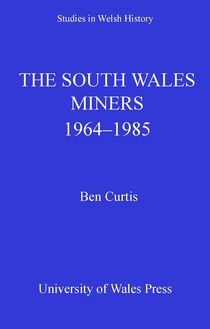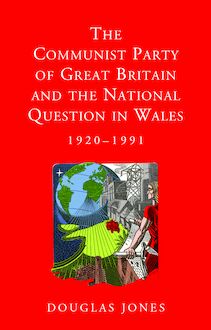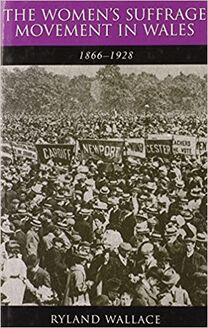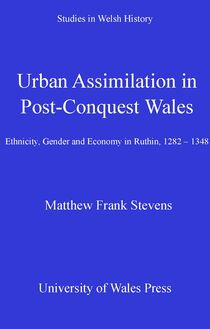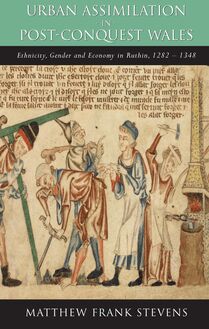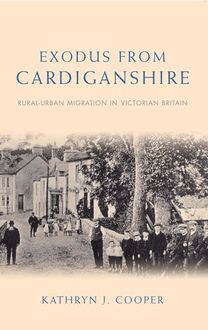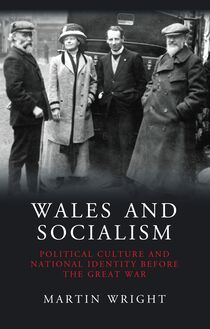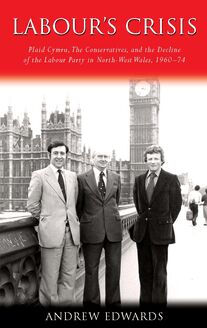The Communist Party of Great Britain and the National Question in Wales, 1920-1991 , livre ebook
167
pages
English
Ebooks
2017
Vous pourrez modifier la taille du texte de cet ouvrage
Obtenez un accès à la bibliothèque pour le consulter en ligne En savoir plus
Découvre YouScribe en t'inscrivant gratuitement
Découvre YouScribe en t'inscrivant gratuitement
167
pages
English
Ebooks
2017
Vous pourrez modifier la taille du texte de cet ouvrage
Obtenez un accès à la bibliothèque pour le consulter en ligne En savoir plus
Publié par
Date de parution
15 octobre 2017
Nombre de lectures
1
EAN13
9781786831330
Langue
English
Poids de l'ouvrage
1 Mo
While electorally weak, the Communist Party of Great Britain and its Welsh Committee was a constant feature of twentieth century Welsh politics, in particular through its influence in the trade union movement. Based on original archival research, the present volume offers the first in-depth study of the Communist Party’s attitude to devolution in Wales, to Welsh nationhood and Welsh identity, as well as examining the party’s relationship with the Labour Party, Plaid Cymru and the labour and nationalist movements in relation to these issues. Placing the party’s engagement of these issues within the context of the rapid changes in twentieth century Welsh society, debates on devolution and identity on the British left, the role of nationalism within the communist movement, and the interplay of international and domestic factors, the volume provides new insight into the development of ideas by the political left on devolution and identity in Wales during the twentieth century. It also offers a broad outline of the party’s policy in relation to Wales during the twentieth century, and an assessment of the role played by leading figures in the Welsh party in developing its policy on Wales and devolution.
Publié par
Date de parution
15 octobre 2017
Nombre de lectures
1
EAN13
9781786831330
Langue
English
Poids de l'ouvrage
1 Mo
STUDIES IN WELSH HISTORY
Editors
RALPH A. GRIFFITHS CHRIS WILLIAMS ERYN M. WHITE
37
THE COMMUNIST PARTY OF GREAT BRITAIN AND THE NATIONAL QUESTION IN WALES, 1920 -1991
THE COMMUNIST PARTY OF GREAT BRITAIN AND THE NATIONAL QUESTION IN WALES, 1920 -1991
by
DOUGLAS JONES -->
CARDIFF
UNIVERSITY OF WALES PRESS 2017
© Douglas Jones, 2017
All rights reserved. No part of this book may be reproduced in any material form (including photocopying or storing it in any medium by electronic means and whether or not transiently or incidentally to some other use of this publication) without the written permission of the copyright owner. Applications for the copyright owner s written permission to reproduce any part of this publication should be addressed to the University of Wales Press, 10 Columbus Walk, Brigantine Place, Cardiff CF10 4UP.
www.uwp.co.uk
British Library CIP Data
A catalogue record for this book is available from the British Library
ISBN 978-1-78683-131-6 (hardback)
ISBN 978-1-78683-130-9 (paperback)
eISBN: 978-1-78683-133-0
The right of Douglas Jones to be identified as author of this work has been asserted in accordance with sections 77 and 79 of the Copyright, Designs and Patents Act 1988.
The University of Wales Press acknowledges funding by the Welsh Books Council in publication of this volume.
Cover image: Arthur Miles (attrib.), 1944, pamphlet cover design, Welsh Committee of the Communist Party of Great Britain.
SERIES EDITORS FOREWORD
Since the foundation of the series in 1977, the study of Wales s history has attracted growing attention among historians internationally and continues to enjoy a vigorous popularity. Not only are approaches, both traditional and new, to the study of history in general being successfully applied in a Welsh context, but Wales s historical experience is increasingly appreciated by writers on British, European and world history. These advances have been especially marked in the university institutions in Wales itself.
In order to make more widely available the conclusions of original research, much of it of limited accessibility in postgraduate dissertations and theses, in 1977 the History and Law Committee of the Board of Celtic Studies inaugurated this series of monographs, Studies in Welsh History . It was anticipated that many of the volumes would originate in research conducted in the University of Wales or under the auspices of the Board of Celtic Studies, and so it proved. Although the Board of Celtic Studies no longer exists, the University of Wales continues to sponsor the series. It seeks to publish significant contributions made by researchers in Wales and elsewhere. Its primary aim is to serve historical scholarship and to encourage the study of Welsh history.
CONTENTS
SERIES EDITORS FOREWORD
LIST OF ACRONYMS AND ABBREVIATIONS
Introduction
1 Conspicuous by its Absence, 1920-1932
2 The Awakening of a National Consciousness within the Communist Party in Wales, 1933-1950
3 Praxis, Neglect and Renewal, 1950-1969
4 Devolution, Defeat and Dissolution, 1970-1991
Conclusion
BIBLIOGRAPHY
LIST OF ACRONYMS AND ABBREVIATIONS
AEU
Amalgamated Engineering Union
ARJAC
Anglo-Russian Joint Advisory Council
BDA
Broad Democratic Alliance
BRS
The British Road to Socialism
BSP
British Socialist Party
BUF
British Union of Fascists
CC
Central Committee
CCG
Communist Campaign Group
CLC
Central Labour College
CLP
Communist Labour Party
CND
Campaign for Nuclear Disarmament
Comintern
Communist (Third) International
CPB
Communist Party of Britain
CPGB
Communist Party of Great Britain
CPI
Communist Party of Ireland
CYIG
Welsh Language Society
DPC
District Party Committee
EC
Executive Committee
ECCI
Executive Committee of the Communist International
GFTC
Glamorgan Federation of Trades Councils
ILP
Independent Labour Party
ILS
International Lenin School
KS
Communist Party of Czechoslovakia
LCDTU
Liaison Committee for the Defence of Trade Unions
MFGB
Mineworkers Federation of Great Britain
MMM
Miners Minority Movement
NCB
National Coal Board
NCC
National Cultural Committee
NCP
New Communist Party
NMM
National Minority Movement
NUM
National Union of Mineworkers
NUT
National Union of Teachers
NUWM
National Unemployed Workers (Committee) Movement
OB
Organisational Bureau
PB
Political Bureau
PC
Political Committee
PCE
Spanish Communist Party
PCF
French Communist Party
PCI
Italian Communist Party
PWC
Parliament for Wales Campaign
RILU
Red International of Labour Unions
RSS
Rhondda Socialist Society
RWG
Revolutionary Workers Groups
SDF
Social Democratic Federation
SLP
Socialist Labour Party
SNP
Scottish National Party
SWCC
South Wales Communist Committee
SWMF
South Wales Miners Federation
SWSS
South Wales Socialist Society
TGWU
Transport and General Workers Union
TUC
Trades Union Congress
URC
Unofficial Reform Committee
USC
United Socialist Council
WAC
Wales for the Assembly Campaign
WCSMC
Wales Congress in Support of Mining Communities
WEC
Welsh Executive Committee
WRCL
Welsh Regional Council of Labour
WSF
Workers Socialist Federation
YCL
Young Communist League
INTRODUCTION
The establishment of the National Assembly for Wales in 1999 marked the culmination of another stage of the debate on Welsh self-government which, commencing in 1886 with the formation of Cymru Fydd, had spanned a long twentieth century in Welsh politics. A central component of this debate was the nature of the relationship between socialism and nationalism, one of the most divisive and complex issues in twentieth-century Welsh politics. The role played by Plaid Cymru and the Labour Party on the road to the National Assembly has, understandably, formed the basis for most of the academic work related to the devolution debate. A small, but growing body of work has begun to focus on Labour s relationship with nationalism and the national question and on the role of socialism within Plaid Cymru. 1 In contrast, the Communist Party of Great Britain s (CPGB) relationship with the national question remains a neglected part of the story of Welsh devolution, and yet from the mid-1930s onwards the party was supportive of Welsh self-government, offered progressive policies on the Welsh language and played an active role in both the Parliament for Wales Campaign of the 1950s and the Wales for the Assembly Campaign during the 1979 devolution referendum campaign. The CPGB s absence from this debate reflects its absence from the broader field of Welsh political studies, which, by focusing on the two main Welsh parties, Labour and Plaid, has left the CPGB s role in Welsh politics relatively unexplored - a surprising omission since despite its electoral insignificance the party had influence in excess of its small size, playing a prominent role within the Welsh labour movement and within a number of extra-parliamentary political movements. The party therefore deserves serious attention when discussing Welsh politics and it offers an interesting contrast to both the Labour Party and Plaid Cymru s approach to the national question, and thus an original perspective from which to approach the relationship between socialists and the national question in Wales.
The history of the CPGB has undergone a significant transformation since the late 1980s, a transformation which can largely be attributed to the opening of the party s archives in Manchester to the public in 1994 along with those of the Communist International in Moscow, both of which have provided a new impetus for research. 2 From being a relatively under-researched party, it now boasts a number of well-researched histories, both general and thematic. 3 Unfortunately, the history of the party in Wales remains an under-researched area. There is no specific work on the party in Wales and where the party s history in Wales has been studied in any detail it has tended to be in the context of other subjects - its often-prominent role in relation to the South Wales Miners Federation has been covered in Hywel Francis and Dai Smith s history of that organisation; both Hywel Francis and Robert Stradling have studied the party s involvement in the Spanish Civil War and the International Brigades; Stuart Macintyre s volume on working-class militancy during the inter-war period focuses partly on the communists of the village of Maerdy or Little Moscow ; while, most recently, Kevin Morgan, Andrew Flinn and Gidon Cohen have partly focused on Wales in relation to discussion on issues such as migration and ethnicity and their effects on the party and on the nature of party membership. 4 There is also a small number of biographies and autobiographies of leading figures in the Welsh party, the most recent of which is Nina Fishman s outstanding biography of Arthur Horner. 5 The literature on the party s relationship with the national question in Wales and the devolution debate is even sparser, amounting to all of two articles. 6 To an extent historians of the party in Wales, as in the rest of Britain, were restricted by the lack of access to the party s archives and, despite the opening of the party s archives, those of the Welsh party remained inaccessible until 2002, when they were deposited at the National Library of Wales, having resided in the garage of the former secretary of the Welsh party, Bert Pearce, since the party s dissolution. This development has, for the first time, offered historians the chance to research the history of the Welsh party more fully than ever before.
This study seeks to answer three key questions. First, what was the nature of the relationship between the CPGB and the national question in Wales between 1920 and 1991? While the national question in Wales was only fleetingly a major concern for the British party, following the nationalist resurgence of the mid- to late 1960s and in the run-up to the 1979 dev




